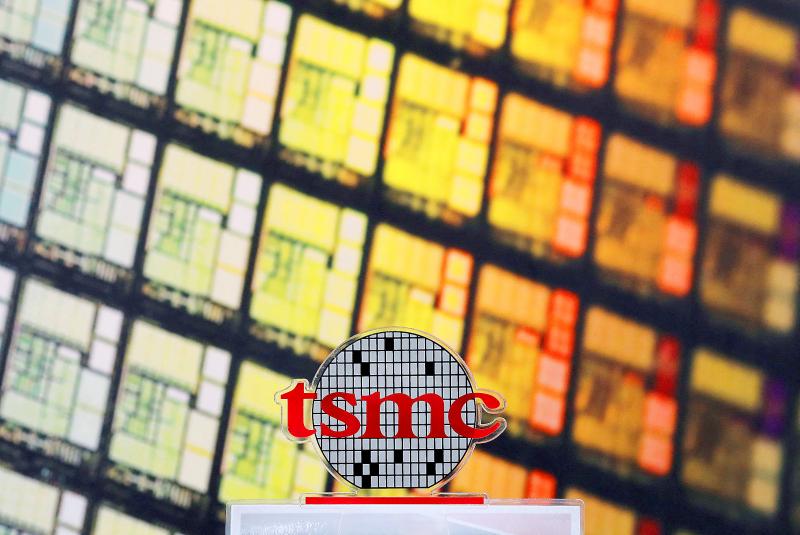Taiwan Semiconductor Manufacturing Co (TSMC, 台積電) executives on Thursday said that it would obtain the next version of ASML Holding NV’s most advanced chipmaking tool in 2024.
The tool — called “high-NA EUV” — produces beams of focused light that create the microscopic circuitry on computer chips used in phones, laptops, vehicles and artificial intelligence devices, such as smart speakers.
EUV stands for extreme ultraviolet, the wavelength of light used by ASML’s most advanced machines.

Photo: Tyrone Siu, Reuters
“TSMC will bring in high-NA EUV scanners in 2024 to develop the associated infrastructure and patterning solution needed for customers to fuel innovation,” TSMC senior vice president of research and development Y.J. Mii (米玉傑) said at the company’s technology symposium in Silicon Valley.
MASS PRODUCTION
Mii did not say when the device, the second generation of extreme ultraviolet lithography tools for making smaller and faster chips, would be used for mass production.
TSMC rival Intel Corp has said it would use the machines in production by 2025 and that it would be the first to receive the machine.
As Intel enters the business of making chips that other companies design, it would be competing with TSMC for those customers.
TSMC senior vice president of business development Kevin Zhang (張曉強) clarified that TSMC would not be ready for production with the new high-NA EUV tool in 2024, but that it would be used mostly for research with partners.
“The importance of TSMC having it in 2024 means they get to the most advanced technology faster,” said TechInsights chip economist Dan Hutcheson, who was at the symposium.
“High-NA EUV is the next major innovation in the technology that will put the chip technology at the lead,” Hutcheson said.
NANOSHEET
TSMC also gave more details on the technology for its 2-nanometer chips, which it said are on track for volume production in 2025.
TSMC said it has spent 15 years developing so-called “nanosheet” transistor technology to improve speed and power efficiency, and will use it for the first time in its 2-nanometer chips.

NEW IDENTITY: Known for its software, India has expanded into hardware, with its semiconductor industry growing from US$38bn in 2023 to US$45bn to US$50bn India on Saturday inaugurated its first semiconductor assembly and test facility, a milestone in the government’s push to reduce dependence on foreign chipmakers and stake a claim in a sector dominated by China. Indian Prime Minister Narendra Modi opened US firm Micron Technology Inc’s semiconductor assembly, test and packaging unit in his home state of Gujarat, hailing the “dawn of a new era” for India’s technology ambitions. “When young Indians look back in the future, they will see this decade as the turning point in our tech future,” Modi told the event, which was broadcast on his YouTube channel. The plant would convert

‘SEISMIC SHIFT’: The researcher forecast there would be about 1.1 billion mobile shipments this year, down from 1.26 billion the prior year and erasing years of gains The global smartphone market is expected to contract 12.9 percent this year due to the unprecedented memorychip shortage, marking “a crisis like no other,” researcher International Data Corp (IDC) said. The new forecast, a dramatic revision down from earlier estimates, gives the latest accounting of the ongoing memory crunch that is affecting every corner of the electronics industry. The demand for advanced memory to power artificial intelligence (AI) tasks has drained global supply until well into next year and jeopardizes the business model of many smartphone makers. IDC forecast about 1.1 billion mobile shipments this year, down from 1.26 billion the prior

People stand in a Pokemon store in Tokyo on Thursday. One of the world highest-grossing franchises is celebrated its 30th anniversary yesterday.

Zimbabwe’s ban on raw lithium exports is forcing Chinese miners to rethink their strategy, speeding up plans to process the metal locally instead of shipping it to China’s vast rechargeable battery industry. The country is Africa’s largest lithium producer and has one of the world’s largest reserves, according to the US Geological Survey (USGS). Zimbabwe already banned the export of lithium ore in 2022 and last year announced it would halt exports of lithium concentrates from January next year. However, on Wednesday it imposed the ban with immediate effect, leaving unclear what the lithium mining sector would do in the